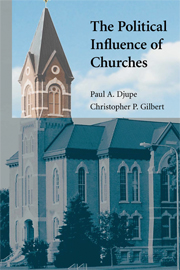Book contents
- Frontmatter
- Contents
- Acknowledgments
- Introduction: A Theory of Religious Influence on Political Behavior
- 1 Social Networks and Church Structure
- 2 Clergy Influences and Religious Commitment Reconsidered
- 3 Church-Centered Influences on Public Opinion
- 4 The Resourceful Believer
- 5 The Construction of Political Mobilization in Churches
- 6 Present but Not Accounted for?
- 7 Conclusion
- Appendix: Variable Coding
- References
- Index
3 - Church-Centered Influences on Public Opinion
Published online by Cambridge University Press: 05 June 2012
- Frontmatter
- Contents
- Acknowledgments
- Introduction: A Theory of Religious Influence on Political Behavior
- 1 Social Networks and Church Structure
- 2 Clergy Influences and Religious Commitment Reconsidered
- 3 Church-Centered Influences on Public Opinion
- 4 The Resourceful Believer
- 5 The Construction of Political Mobilization in Churches
- 6 Present but Not Accounted for?
- 7 Conclusion
- Appendix: Variable Coding
- References
- Index
Summary
chapters 1 and 2 have presented a forceful, empirical argument for the incorporation of specific measures of church-based contextual influence into models exploring religious influences on citizen political opinion and behavior. The evidence also offers a stark reminder that simply assessing clergy speech patterns or levels of religious commitment will not adequately capture the political influence of church. We move now to comprehensive tests of our theoretical framework, focusing in this chapter on the political opinions of sample ELCA and Episcopal Church members. Most importantly, this chapter explores the contours of a larger research agenda, imagining how the investigation of religion and politics can intersect with and help advance public opinion research more generally. As we have articulated throughout this book, the key is to conceptualize “religion” as a community of individuals who may share some common set of beliefs and meet together on a regular basis to engage in communicative behaviors: listening to clergy, praying collectively, talking with each other, reading announcements, and observing what other members think and do religiously and politically. Within this framework, a whole host of interesting and important questions arise, but primarily: What individual, environmental, and social conditions affect political learning and persuasion in church?
Congregations are accessible communities with tremendous diversity within and between them in terms of leadership-membership dynamics, message content and exposure, member attributes, and social ties. This diversity allows for comprehensive nonexperimental studies of the roots of church member political opinions, employing rigorous tests of causation.
- Type
- Chapter
- Information
- The Political Influence of Churches , pp. 90 - 154Publisher: Cambridge University PressPrint publication year: 2008



